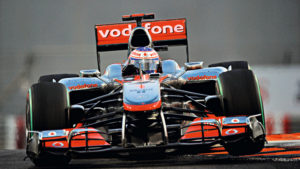
F1 can be a gruelling sport, especially when driving in high temperatures and on dynamic tracks. We caught up with Dan Williams, sports scientist for F1 driver Esteban Ocon, who shared his experience improving some of the world’s top athletes
Environment
The most physical challenge for F1 drivers is the environment. Not only does the race course affect training but so do other elements like the temperature and humidity. Sahara Force India sport scientist Dan Williams, speaking as part of the Farah menswear Race Ready series, said that even in countries that aren’t too hot or humid ‘the sweat rate is very high, and with sweat being unable to evaporate, hydration can be a massive issue during the race, so we focus the training on preparing for these temperatures.’
Sleep
A lack of sleep can have severe mental and physical repercussions. Sleep management is particularly difficult for athletes who are constantly travelling, so Williams has to ensure that the drivers’ downtime is managed carefully. So, what’s the secret to being a well-rested F1 driver? ‘Arriving as early as possible to get more time to sync to the time zone and climate,’ says Williams. ‘Getting everything in tune and then getting straight on it again.’ Dan recommends 8 hours sleep every night to ensure recovery and energy for the next day.
Before the race
‘The routine leading to the race is always very similar,’ says Williams. ‘We focus on staying on top of hunger and thirst and ensuring that sleeping patterns have been sufficient.’ On the day of the race, Williams does some dynamic work, stretches and exercises with the drivers. It’s important he gets them moving, warmed up, and mentally prepared for the race.
Nutrition
‘The driver will usually eat a light meal 2-3 hours before the race’, says Williams. This means that the food is broken down before the driver enters the car, ensuring they’re more alert and ready for the race.
Technology
Fitness is always about perfecting the basics, but Williams says that idiosyncratic technologies have helped polish the drivers’ skills on the track. ‘We use reaction lights to improve the driver’s reaction times, and steering machines to improve the driver’s steering,’ says Williams.
See Dan Williams talk the Sepang International Circuit below:

